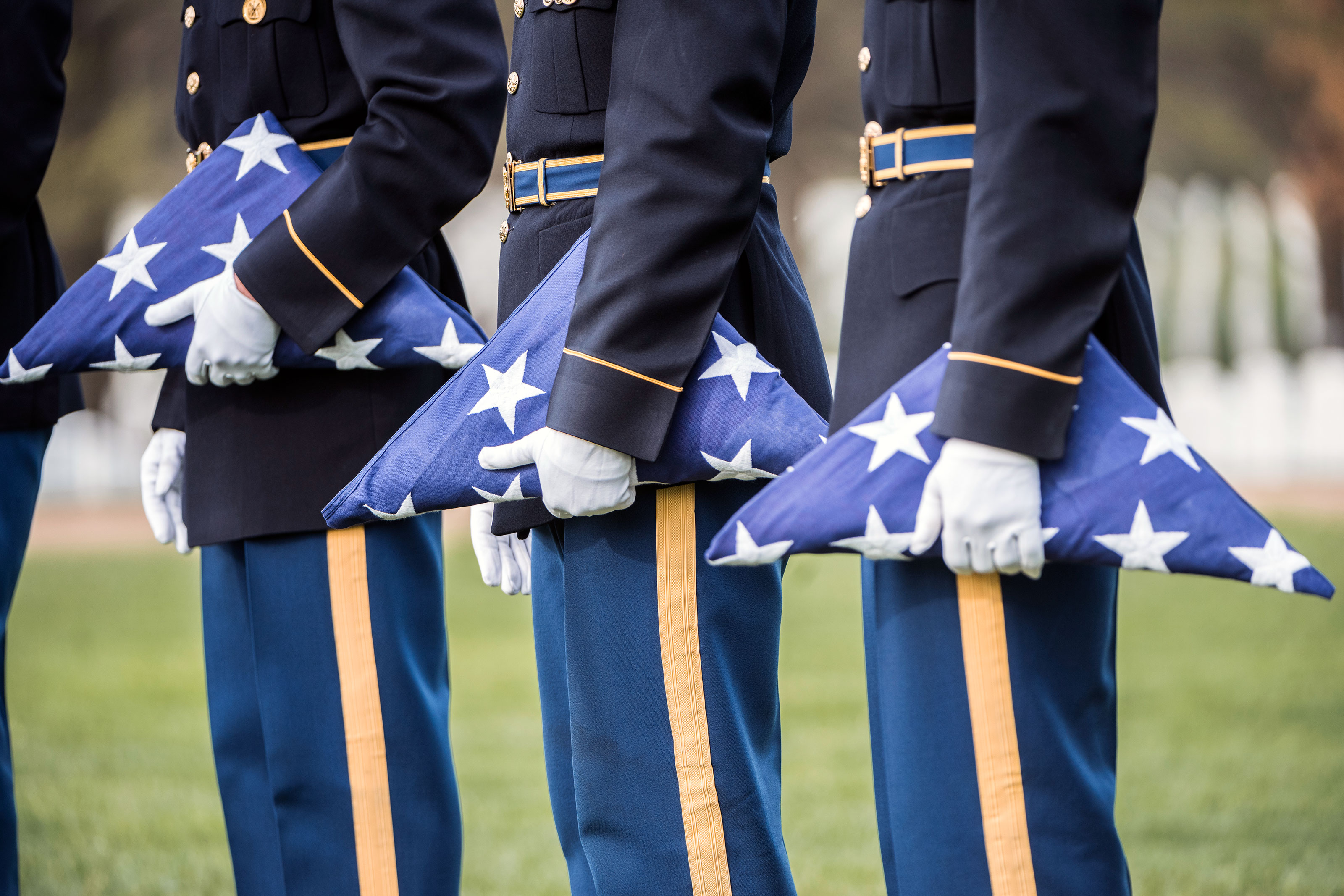
Willie Lathon Jr., a U.S. Army veteran who served in the Vietnam War, died June 3, less than three months into the pandemic.
He was buried alongside other veterans and their families in Abraham Lincoln National Cemetery in Elwood. Because of the coronavirus pandemic, the only military honor provided to Lathon’s family was folding and presenting them with an American flag.
“I gave his daughter the flag,” said his wife, Sheraine Lathon, 69, of Richton Park. “Then I offered him up to the Lord. That was it. It was about 10 minutes.”
Many military families have had to forgo receiving the ceremonial honors typical for a veteran funeral — no 21-gun salutes or bugle playing “taps.” But families seldom waited to bury their loved ones, even when they weren’t even able to go to the cemetery and see them laid to rest.
Some families opted to delay holding a visitation with extended family and friends until capacity restrictions loosened. With Memorial Day weekend bringing to the forefront memories of veterans who have died in service and those who have died during the pandemic, some families are questioning whether to have a service now and relive the grief, funeral directors said.
“They’ve done some healing through grief for the last number of months,” said Stephen Dawson, president and owner of Sax-Tiedemann Funeral Home and Crematorium in Franklin Park. “Trying to reopen that and relive that and have a formal, public way to express grief … people don’t want to reopen old wounds.”
For some, holding a funeral service at a later date is like “trying to start that (grief cycle) all over again,” Dawson said.
Especially early in the pandemic, many veterans were sent to Lincoln National Cemetery for direct interment, or burial immediately after their death, without a service or memorial, said Antonio Henderson, the cemetery’s assistant director. The cemetery gave those families an option to have memorial services in recent months as pandemic guidelines loosened, which has been “very popular” among military families, Henderson said.
The national cemetery has since expanded capacity limits to match changing guidelines and now provides veterans with a more traditional burial, Henderson said. On May 10, the cemetery welcomed back its full Memorial Squad team, which provides military honors, and everything is “just about” back to normal, Henderson said.
“It’s the last reminder of the service that they gave to the country,” Henderson said. “It also brings closure to the family. It’s not just the husband or wife that’s in the military. It’s also the family as well.”
At the Archdiocese of Chicago Catholic Cemeteries, the number of burials held steady over the past year, with no notable surges or drops, said Susan Thomas, spokesperson for the Archdiocese of Chicago.
Sheraine Lathon is pastor at Liberty Temple Full Gospel Church in the Beverly View neighborhood on the South Side. During the pandemic, the church held services for about 18 congregants who have died, including her husband, she said, though some of the services had to be livestreamed on the church’s Facebook page.
In the early months of the pandemic, burial services at Lincoln National Cemetery — including Willie Lathon’s — were as small as 10 people or fewer, Henderson said.
“Not just my family, but many families suffered through only being able to do so much,” Sheraine Lathon said, “not being able to be collectively with your family.”
Golden Gate Funeral Home, part of the national Veterans Funeral Care network, handled arrangements for Willie Lathon and many other veterans who died during the pandemic.
Watching families stay in their cars for services and not have proper military honors was “one of the anguishes that we experienced,” said Sylvester Dunn, the Gresham funeral home’s general manager.
Military veterans “faced some horrendous things during their tour of duty,” Dunn said, and allowing families to celebrate their loved ones “in the right way” helps provide them closure.
But instead of delaying burials during a pandemic with no clear end in sight, Dunn said families went forward with laying to rest their loved ones, despite the disappointment, sadness and loneliness without extended family and friends there. The funeral home offered those families the chance to hold a memorial service at a later time for free, Dunn said.
Willie Lathon had been receiving dialysis treatments for two years and spent much of that time in a hospital. Sheraine Lathon said she is grateful her husband died in their home of natural causes instead of alone in a hospital room like many COVID-19 patients. He was 72.
Thursday will mark one year since her husband died, and June 11 would have been the Lathons’ 39th wedding anniversary, Sheraine Lathon said, on top of Memorial Day weekend honoring veterans across the country.
But despite the anniversaries and holidays stirring up memories of her husband, Sheraine Lathon said she’s “OK.”
“Toward the end, he was suffering. He was trying to be brave,” she said. “I have peace because I know where he is. He’s not suffering anymore”
This article is written by Clare Proctor from Chicago Tribune and was legally licensed via the Tribune Content Agency through the Industry Dive publisher network. Please direct all licensing questions to [email protected].
© Copyright 2021 Chicago Tribune. All rights reserved. This material may not be published, broadcast, rewritten or redistributed.
